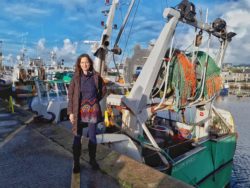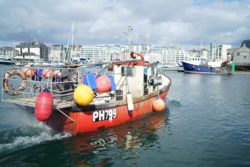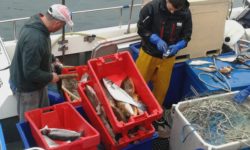Brexit and small-scale fishers: an insider view from Better Food fish supplier, Sole of Discretion
Brexit will make a difference to our small operation here at Sole of Discretion.
The increased paperwork that now goes along with our exports is a double-edged sword. On the one hand, these checks and balances are worthwhile from both an environmental and food safety standpoint; they help ensure that fishers are not trading in illegally landed or endangered species, for example. But they also increase workload and costs, and will hinder many small-scale food producers’ abilities to import and export with the EU. This will leave consumers in the UK with reduced access to small, artisan producers and support the dominance of global brands.
A raw deal
Trade aside, what does Brexit mean for our fishers?
There’s been much talk of a 25% increase in quota to UK fishers as a result of the Brexit deal. In reality though, the Brexit deal resulted in the EU agreeing to hand over 25% of their current fishing quota of certain UK fish stocks. The EU currently has rights to fish a third of the total quota from UK waters, so this uplift for our fishers actually works out at just 8.3%. It’s no wonder that UK fishers don’t feel they’ve got the deal they were promised.
This small increase means little for the small-scale fisher, unless by some miracle the government distributes it based on the fishers’ relative impact on the environment, the economy and society. This is exactly how the EU’s new allocation system is determined, but currently it seems likely the UK won’t follow suit.
One of the biggest missed opportunities of the deal is not to have pushed for exclusive access to the zone between 6 and 12 nautical miles (nm) from our shores. This could have made an enormous difference to our small-scale fishers. As it stands, however, those small boats under 10m (such as the ones we at Sole of Discretion work exclusively with) will continue to be impacted by foreign-owned supertrawlers (sometimes dubbed ‘factory ships’) , which severely limit the number of fish that make it through to be caught by our small-scale boats, and make it difficult for them to leave their static nets out beyond 6 nm for fear of the supertrawlers towing their equipment away.
The sticky business of quotas
 To better understand why these decisions matter so much to the UK fishing industry—and especially to small-scale fishers—it’s worth looking at some of the statistics about fishing and quota allocation in the UK.
To better understand why these decisions matter so much to the UK fishing industry—and especially to small-scale fishers—it’s worth looking at some of the statistics about fishing and quota allocation in the UK.
The current UK fishing sector employs about 12,000 fishermen, and contributes around 0.02% of GDP. The reasons for these low figures are complex, but can in some part be explained by foreign ownership of the quotas covering UK fish stocks.
In the first place, the UK only owns half of the fishing rights of UK waters, and—as explained above—we’ll only regain little over 8% of that with the new deal. But even the half we do have rights over is largely foreign-owned, with something over 50% of this quota in the hands of foreign interest. For example, one Dutch supertrawler company owns a quarter of the UK’s quota, and £160m worth of England’s fishing quota is in the hands of vessels owned by companies based in Iceland, Spain and the Netherlands.
The UK fleet is made up of nearly 6000 boats, 21% of which are more than 10 metres in length, while 79% are 10 metres or smaller – the official ‘small-scale, inshore fishing’ definition. The distribution of our quota heavily favours large-scale fishing, too – you can read more about the damaging impacts of this type of fishing in our first blog for Better Food.
Counterintuitively, the under-ten fleet is allocated less than 2% of the UK’s own quota, with the larger fleet taking the remaining 98% share. It is clear from this that already the small-scale fishers work at huge disadvantage, without the additional impacts of limited access to near-shore waters, and foreign quota ownership.
Why does it matter?
We need transparency on our food now more than ever, as food standards may potentially drop post Brexit, and environmental credentials with it. Moreover, the dire consequences of a post-COVID economy, makes building local economic resilience ever more important. The small-scale sector employs more people per kilo of fish landed than the large sector and, for the most part, with their low impact trawls, static nets, lines and pots, their catch has higher value than that of the industrial sector. Their income is locally spent, and small boat catch is processed locally, benefitting land-based employment. Though foreign ships fishing UK quotas must have economic links to the UK, the bulk of the economic benefit is by no means reaped by our nation.
At Sole of Discretion we remain focussed on supporting the small-scale fishers, offering them fair, agreed prices irrespective of fluctuating market prices in order to keep the skills and livelihoods of these fishers alive. Catch less, earn more, treat each fish with dignity and turn each one into tasty, nutritional food. That is what we set out to do, and thanks to your support, continue to be able to deliver today.
With thanks to Jerry Percy’s piece for NUTFA (New Under Ten’s Fisheries Association), The New Economic Foundation’s research and Greenpeace’s Unearthed report.
